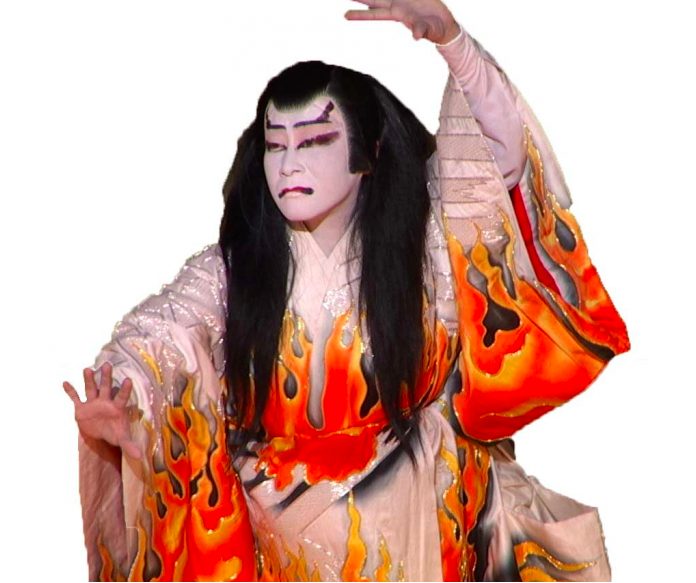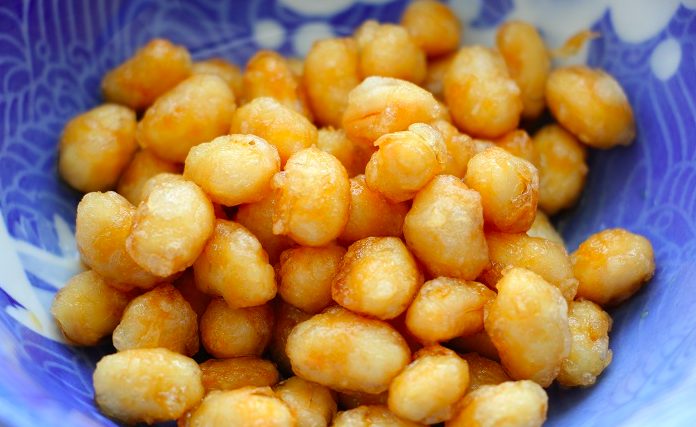Author: Hannah Wayand (Global Bean), based on the contributions of Miyuki Watanabe and Cecilia Antoni

Miyuki Watanabe is from a small town in a country side of Okayama Prefecture. She tells us: “My father grew a lot of things such as rice, shiitake mushrooms, chestnuts, and peaches etc. I was eating always tasty seasonal foods.. We were not rich, but I think I grew up eating a lot of delicious food.”
She is working in the restaurant business for about 20 years now and is married and living in Germany since 2009. Miyuki told us about this very special custom and revealed to us a traditional recipe with soybeans! You can follow her on Instagram here.
Setsubun literally means the “separation of the seasons” and is a Japanese festival that bids farewell to winter and celebrates the beginning of spring. It is traditionally held on 3 February and marks the turning of the seasons according to the ancient Japanese lunar calendar.

On Setsubun, horned demons, so-called oni, are up to mischief. To expel them, the ritual mamemaki (豆撒き) is performed. The ritual is based on the story in which a woman expelled an oni by throwing at it the first thing that came to her hands: roasted soybeans.
Picture © Cecilia Antoni
Accordingly, to this day, soybeans are either thrown out of the front door, or at somebody wearing an oni mask. Whereas in the earlier days, only the family member whose Chinese zodiac sign matched that of the new year was allowed to throw, nowadays mostly children throw the beans at their parents who are dressed up as demons. While doing so, everyone shouts the traditional, magical formula: “Oni wa soto! Fuku wa uchi!” – Demons out! Luck in!
The beans also bring luck when eaten and banish diseases and suffering. By the way, the right amount of “lucky beans” is linked to one’s age and is doubled with the prospect of the coming years. To do this, simply collect the already thrown beans, count them and eat.


Pictures © Miyuki Watanabe
AmaKara (sweet and salty) beans
By Miyuki Watanabe

Ingredients – around 4 servings:
- 200g boiled soya beans.
- 2 tablespoons katakuriko (potato starch)
- 2 tablespoons each of soy sauce and sugar
- 1 tablespoon vinegar
Directions:
- Wash boiled soybeans with water. sprinkle 2 tablespoons katakuriko (potato starch).
- Heat 2 tablespoons oil in a frying pan over medium to high heat and add soybeans.
- In the first 2 minutes, the soybeans will stick to each other, so shake the pan or flip the soybeans up and down.
- After 3 to 4 minutes, the soybeans will start to come apart. Reduce the heat to medium, rest your hands a little, and use the chopsticks to loosen or shake them.
- In 5 minutes, the batter will be slightly charred. When the batter is white and crispy, turn off the heat.
- Leave it for 1 minute.
- Mix sauce in a bowl and add soybeans. Better not to put the sauce directly into the pan.
- After dressing with the sauce, quickly place in a bowl to keep crispy. For lunch boxes, soak the soybeans longer.
Fuku Mame (roasted soybeans)
By Cecilia Antoni
If you want to get rid of the demons at your house or want to welcome spring, here’s a recipe for roasted soybeans:
Ingredients – for 4 portions:
- 250 g soaked soybeans
- 1 tbsp oil (vegetable, sesame or peanut oil)
- 1 tbsp soy sauce or tamari
Preparation:
- Soak the soybeans overnight.
- Drain and dry on a towel for 15 minutes.
- In a bowl, mix oil and soy sauce, add soybeans and marinate for about 30 minutes.
- Preheat oven to 175 °C.
- Spread the marinated soybeans on a baking sheet and roast in the oven for about 40 minutes.
- Turn them occasionally so that the beans can brown evenly on all sides.
- If they are crispy when you try them, they are done.
- Let them cool on a large plate.



